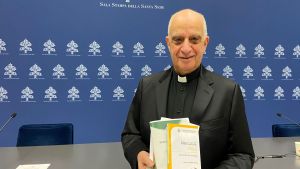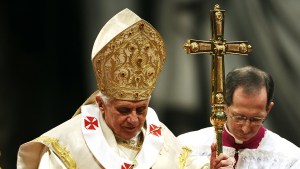In his audience on August 17, 2011, Benedict XVI spoke of a particular type of prayer: meditation. The Holy Father defines meditation as “making contact with the heart of God in our mind.” Christian tradition calls it “mental prayer.” Meditation is about remembering what the Lord has done for us, and reflecting deeply on how he is present and active in the world and in our lives. He elaborates:
St. Augustine compares meditation on the mysteries of God to the assimilation of food and uses a verb that recurs throughout the Christian tradition, “to ruminate”; that is, the mysteries of God should continually resonate within us so that they become familiar to us, guide our lives and nourish us, as does the food we need to sustain us.
“Mary pondered all these things in her heart”
Benedict XVI goes on to explain the main reason, drawn from Scripture, why the Virgin is the perfect model of meditative prayer. St. Luke the Evangelist twice reports that “Mary treasured all these things and pondered them in her heart” (Lk 2:19; 2:51). First and foremost, she pondered the birth of her Son, who was God’s own Son! Mary pondered at length the gigantic implications of the Incarnation and its meaning.
In fact, as her whole life was marked by the presence of Jesus, it became the object of her continual meditation right up to the Cross and Resurrection. Benedict XVI points out that Mary meditated in the silence of her ordinary life, maintaining within herself and in the course of her activities an interior space for reflection on the Word and will of God. Her unparalleled closeness to the events of salvation made her the perfect model of the meditative believer.
How can we meditate today?
Finally, Benedict XVI asks how we can best meditate on the divine mysteries today, in our own place, as the Virgin Mary once did. Firstly, he recommends setting aside moments of silence during the day. To meditate, we need to find ourselves in a state of inner recollection, which only silence can provide. This is not always easy in our society, which fills its spiritual void with a host of diversions and diversions.
Once we have fulfilled this condition of recollection, the Pope recommends that we base our meditation on the reading of a short passage from Sacred Scripture or from spiritual authors. The idea is to reflect on what we have read and to grasp what this reading says about our lives. These meditative readings will open us up to the “realities of God,” as the Holy Father puts it, but also to what the Lord wants to say to us for our life today.
The Pope does not neglect to mention the Rosary as a means of meditation. By praying the Hail Marys, we are led to think again of the Gospel mystery that forms the substance of the decade we are praying.
We can also meditate on a message that resonated with us in a particular way at Mass, or on a spiritual experience that has marked us. In all cases, meditation is a prayer that brings us closer to God.
Benedict XVI concludes by exhorting us to give time to God and to remain constant in this exercise of prayer. In this way, “it will be the Lord himself who gives us the taste for his mysteries, his words, his presence and action.”



